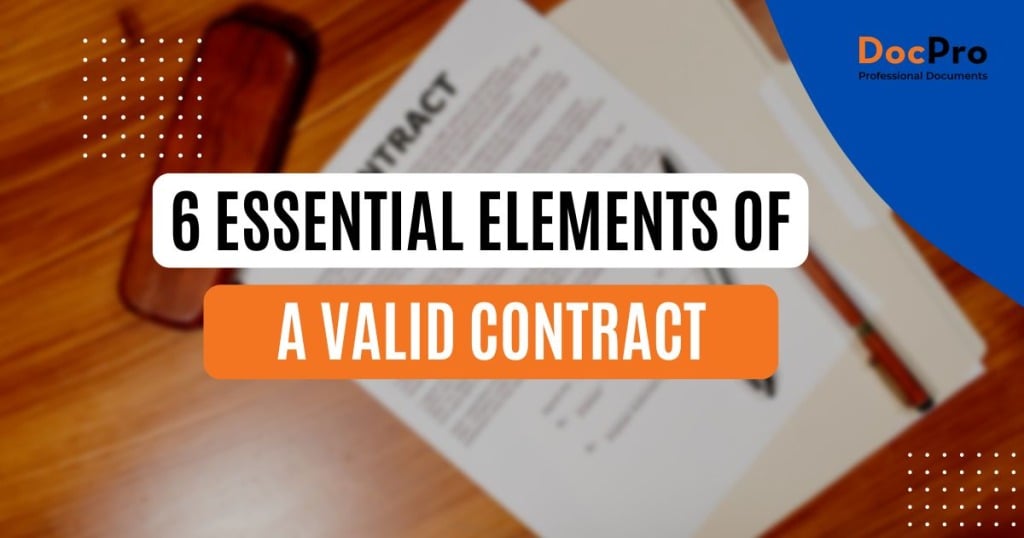6 Essential Elements of a Valid Contract with Examples
2 Jan 2024
10 Dec 2019
min read

Contracts form the backbone of society by establishing trust and minimising risks between parties. A contract is the exchange of an act or promise between two or more individuals where one individual offers the other some form of value in exchange for something in return. Contracts are not always money related, as they often relate to the specific performance of certain obligations or agreements not to carry out certain acts (e.g., non-compete undertakings). A contract is a binding agreement that creates legal obligation(s) recognised by law, meaning that a party can bring a civil claim (or even criminal if fraud is involved) against another party to the contract for breach of contract. To provide a full picture of what makes a valid agreement, we will cover two important areas in contract law: (A) essential elements of a contract, and (B) privity of the contract.
A. 6 Essential elements of a valid contract
Most people assume that once one party has made an offer and the other party has accepted, a contract has been formed. However, there is more to a valid contract than this, and it has nothing to do with how formal the agreement is. A contract can be formal or informal, written or even oral.
What are the 6 elements of a valid contract?
A contract is valid and legally binding if the following 6 essential elements are present
-
-
Offer
-
Acceptance
-
Consideration
-
Intention to create legal relations
-
Legality and capacity
-
Certainty
-

1. Offer
Offer and acceptance analysis form the basis of contract law and the formation of a valid contract. Developed in the 19th century, the offer and acceptance formula identifies the point of formation, where the parties are of 'one mind'.
An offer is a proposal constituting specific terms for one party to enter into an agreement with another party, which is essential to the formation of an enforceable contract.
What is the difference between an 'Offer' and an 'Invitation to Treat'?
It is important to distinguish between an offer and an invitation to treat. A valid contract requires an offer to be accepted, whereas an invitation to treat is not an essential element of a contract.
Whilst an offer can be accepted, an invitation to treat is merely an invitation or willingness to negotiate that one party makes to the other. This is not an offer as it does not show a willingness to be bound on specific terms once accepted.
An invitation to treat gives the party who issues the invitation control over whether the contract should be made or when it should be made. An invitation to treat only constitutes an offer when the wordings are clear, definite and explicit, which leaves nothing open for further negotiation.
Examples of an 'Offer' and an 'Invitation to Treat'
In general, an invitation to tender is an invitation to treat. However, if the invitation is addressed to everyone known to the inviter and the invitation contains an agreement to accept the most competitive bid or states that at least one of the tenders will be considered, then that invitation can be regarded as an offer.
Another example of an invitation to treat would be a restaurant menu that displays prices.
Below is an example of an internship opportunity offer:
https://docpro.com/doc1371/internship-offer-employer-to-candidate-internship-offer-letter
2. Acceptance
Acceptance is an agreement to the specific terms of an offer. Mario Iveljic, a partner at Mag Mile Law, LLC explains that there is not one way of validly accepting a contract - generally, an offeree can accept an offer in any reasonable medium as long as the country or state does not require any specific form.
Offers do not have to be accepted through words; they can be accepted through conduct. If someone purports to accept an offer but accepts on different terms than that of the original offer, that will constitute a counteroffer rather than an acceptance.
The acceptance must normally be communicated to the offeror – silence cannot be treated as an acceptance.
In exceptional circumstances (for example, where the offeree has been given terms of dealing and proceeds with the dealing without formally communicating acceptance), silence may be treated as acceptance.
Below is an example of a letter to accept an employment offer:
https://docpro.com/doc703/job-application-candidate-to-employer-joining-letter-accept-offer

3. Intention to Create Legal Relations
An agreement does not need to be worked out in meticulous detail to become a contract. However, an agreement may be incomplete where the parties have agreed on essential matters of detail but have not agreed on other important points.
The question of whether the parties have reached an agreement is normally tested by asking whether a party has made an offer which the other party has accepted. Agreements may not give rise to a binding contract if they are incomplete or not sufficiently certain. There will usually be no contract if the parties agree ‘subject to contract’ but never quite agree on the terms of the contract.
If the agreement is a stepping stone for a future contract or is an agreement to agree, then the agreement might be void for a lack of intention to create legal relations. Moreover, a domestic contract is presumed not to be legally binding in common law jurisdictions.
For an example of a memorandum of understanding (MOU) concerning a joint venture, please see the link below:
https://docpro.com/doc189/memorandum-of-understanding-mou-joint-venture-neutral
4. Consideration
As Nelson Johnson, an attorney at Griffith, Lowry & Meherg, LLC puts it: if there is no consideration, there is no contract. Without consideration, the contract is both unenforceable at equity and in law[1].
Consideration constitutes something of benefit to the person who has the obligation or who makes a promise to do something (the promisor). It can also be something detrimental to the person who wants to enforce the obligation, or who has the benefit of the promise (the promisee). There is no need for an 'adequate' value: if some value is given for the promise, it would be sufficient consideration.
Where the consideration of one party is not absolutely clear, the agreement will generally include language such as ‘FOR GOOD AND VALUABLE CONSIDERATION, the receipt of which is hereby acknowledged’ in the recital.
Alternatively, one can make the document in a deed without the need for consideration.
What is a deed?
If there is a promise to do something but the agreement lacks any consideration, then the agreement must be made in a deed. A deed is a document under seal that either (i) transfers an interest, right or property or (ii) creates an obligation which is binding on someone or some persons or (iii) confirms an act that transferred an interest, right or property. Read 'What is a Deed? Understanding Home Ownership Legal Jargon' for more information.
Not all documents under seal are deeds. There are special requirements for the execution and delivery of deeds. For instance, a contract under seal is a deed. A contract contained in a deed does not require considerations. A person identified in the deed as someone to benefit from a promise can enforce a promise to pay money or can seek damages if the promise is not performed.
However, equitable remedies (e.g. specific performance of obligations other than to pay money) are not available if there is no consideration.
For example, where a party would like to join an existing agreement without clear consideration, the party would enter a deed of adherence: https://docpro.com/doc379/deed-of-adherence-to-agreement-general
5. Legality and Capacity
What would render a contract illegal?
A contract is illegal if the agreement relates to an illegal purpose. For instance, a contract for murder or a contract to defraud the Inland Revenue Department is both illegal and would therefore void contracts that are unenforceable.
Certain contracts may also be unenforceable because they are immoral and against public policy. For example, contracts for sexual services may be unenforceable or even illegal contracts in certain jurisdictions:
https://docpro.com/doc1137/relationship-contract-consent-short-term-sexual-open-relationship
Severability
To avoid the whole contract being rendered unenforceable due to illegality, a boilerplate severability clause can be added to say that if and to the extent that any provision of the contract is held to be illegal, void or unenforceable, such provision shall be given no effect and shall be deemed not to be included in the contract but without invalidating any of the remaining provisions of the contract.
For examples of a boilerplate clause, please see below:
https://docpro.com/doc303/general-boilerplate-document-standard-agreement
Whether the other party has the capacity to contract?
The law presumes that a party to a contract has the capacity to contract. However, minors (children under 18) and mentally disordered people do not have the full capacity to contract. It is for the person claiming the incapacity to prove their incapability to enter a contract.
There are special rules which apply to corporations (including companies), unincorporated associations (including clubs and trade unions), the government (including any government department or officer), public authorities (including local government bodies, state-owned enterprises), organisations and charities.
In what circumstances can a minor enter into a contract?
A minor is capable to enter a contract for 'necessaries' (goods or services that are suitable to the condition of life of a minor). A minor who fails to pay for the goods or services can be sued for a breach of contract.
How about a mentally incapable person?
In general, an agreement entered by a mentally incapable person will be void.
However, a person that becomes mentally incapable later on can authorise another person to make legal decisions on behalf of them by granting the other person the power of attorney (POA).
For an example of a POA document, please see the link below:
6. Certainty
A valid contract requires reasonable certainty for the essential terms. If the parties fail to reach an agreement on the essential terms with reasonable certainty, then it may be contract void even if all other essential elements are present.
What is an essential term?
The definition of essential terms depends on what the parties have set out to achieve. In general, under common law, there are two essential terms: (i) consideration or price of a bargain, and (ii) price to be paid for the promised obligation.
Whether the term is essential is determined by asking whether the term is so important and fundamental to the contract that any breach of such a term will justify termination.
For commercial contracts, provided that the parties have shown an intention to be legally bound, the court can fill in the gaps through five special rules:
-
-
Constructing an essential term by referencing the agreed mechanism
-
Constructing an essential term by referencing the contract as a whole
-
Imply an essential term by referencing to prior course of dealings
-
Imply an essential term by referencing the parties' post-contractual conduct
-
Imply an essential term by law
-
For example, a sales and consignment agreement is a commercial contract :
https://docpro.com/cat51/commercial-sales-and-marketing/sales-and-consignment-agreement
Above are the six essential elements of a valid contract. You should note, however, that the classic doctrine of contract formation has been modified by developments in the law of estoppel, misleading conduct, misrepresentation, unjust enrichment, and power of acceptance.
Since contractual obligations are only binding to the parties of the contract, the issue of third-party contractual enforcement raises the topic of privity of contract. This will now be discussed.

B. Privity of Contract
What is the Privity of Contract?
Privity of Contract is a common law doctrine that provides that a contract cannot confer rights or impose obligations that arise under the contract on anyone other than one of the parties to the contract. As such, the only parties who should be able to sue to enforce their rights or claim damages are the parties to the contract.
However, there are issues associated with contracts made for the benefit of third parties who are unable to enforce the contractual rights as they are not the contracting parties under the contract.
For example, Andrew and Ben entered a contract under which Andrew agreed with Ben to give a valuable diamond to Carrie. Both Andrew and Ben fully intended for Carrie to take the benefit of Andrew’s promise. Under the doctrine of privity of contract, if Andrew for some reason does not give the diamond to Carrie, Carrie cannot sue Andrew as she is not a party to the contract. Ben can sue Andrew for breach of contract, but Ben will only be entitled to nominal damages as Ben has not suffered any actual loss.
Right of Third Parties
In certain common law jurisdictions such as England, some states in Australia, New Zealand, Hong Kong, Singapore, and some provinces in Canada, the parties to a contract can agree that someone who is not a party to the contract can enforce a term of the contract.
This will apply to give a third party a statutory right to enforce a contract term where the term of the contract:
-
Expressly provides that the third party may enforce a term of the contract; or
-
Purports to confer a benefit on that third party
It is also possible to expressly contract out of such statutory right in these jurisdictions by including a term along the line of:
"No Rights under Contracts for Third Parties
A person who is not a party to this Agreement shall have no right under any law to enforce any of its terms."
It is not possible to use a contract to impose an enforceable obligation on someone who is not a party to the contract. However, a similar effect may be achieved by conferring a benefit subject to the third party meeting a condition.

Joint and Several Liability
Joint liability arises when two or more people jointly agree to do the same thing. If either (or any) of the joint obligors (i.e. the people who have the obligation) perform the obligation, the others are discharged from their obligations.
There are strict technical rules of law that apply to joint liability. Liability can also be joint and several. This is where two or more people jointly promise to do the same thing or severally agree to do the same thing.
Performance by one will discharge the liability of all of them. It is presumed that liability is joint where a promise is made by two or more people. If this is not the intention, express wording should be included to make the obligation several.
For further tips on drafting a valid and enforceable contract, you can learn more here: https://docpro.com/blog/valid-enforceable-contract
Frequently Asked Questions (FAQs)
1. Is it possible to enforce a contract that lacks consideration?
No. A contract lacking consideration is unenforceable in law and in equity, as consideration is one of the main and essential requirements of any legal contract.
Mario Iveljic, a founding partner of Mag Mile Law gives a helpful example of an unenforceable contract lacking consideration - one where one party promises to do something it had previously been obligated to do. Since this does not constitute a detriment to the offeror or benefit to the offeree, it cannot be a valid contract.
2. What constitutes valid acceptance of a contract?
Valid acceptance is an acceptance that is unconditional and not qualified [2]. It also has to be communicated in a way that is clear and concise. Further, both parties must be able to understand the terms of acceptance without difficulty.
3. How do you avoid ambiguity in a contract?
Andrew J. Contiguglia, an attorney at The Contiguglia Law Firm, P.C. sums this up: parties must create a contract that truly reflects both parties’ wishes. Ultimately, a contract is a meeting of the mind. To help increase the chances of success, there should be a checklist of clauses and terms that the agreement should include.
Avoiding ambiguity is crucial as contracts are construed against the person who drafted them[3] - as attorney Nelson Johnson emphasises.
4. Is a contract entered by an Intoxicated person valid?
To be valid, a contract must be entered into by individuals with capacity. This is because it has a significant impact on the extent to which an individual understands the terms of the contract. Whether or not such a contract is valid depends on whether the intoxication actually impaired the person's ability to make a legitimate offer or acceptance [4].
If it did impair the person's ability, the contract will in turn become voidable[5]. Note that voidable contracts are not the same as void contracts: the intoxicated individual will have to take action to revoke the contract to make it invalid.
[1] Mario Iveljic, Partner and one of the Founders of Mag Mile Law, LLC
[2] Mark Sadaka, trial lawyer and Founder at Sadaka Law
[3] Nelson Johnson, attorney at Griffith, Lowry & Meherg, LLC
[4] Douglas E. Noll, Attorney at Noll Associates
[5] Andrew J. Contiguglia, owner and president of The Contiguglia Law Firm, P.C.
We hope you found this Blog helpful! Please note that this is just a general summary of the position under common law and does not constitute legal advice. As the laws of each jurisdiction may be different, you may want to speak to your lawyer.
Keywords:

